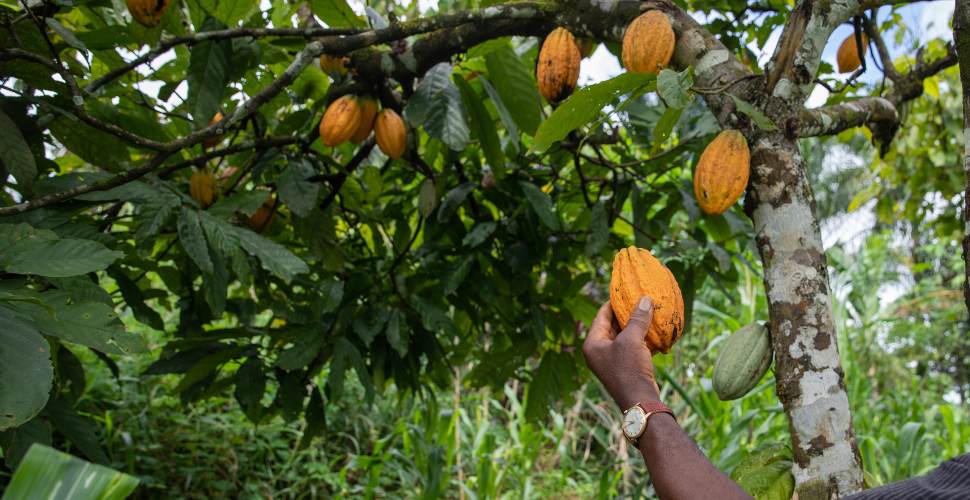The E.U. is negotiating new requirements for companies to conduct human rights and environmental due diligence, but the current draft fails to address the unfair burden on smallholder farmers with extremely limited resources to address these issues.
At a recent event, five farmers told the E.U. the changes they want to see to ensure the new Corporate Sustainability Due Diligence Directive (CSDDD) leads to greater support from and collaboration with companies to tackle social and environmental harms, including forced labor.
Companies must provide technical and financial support to smallholders
“If there is child labor, farmers are blamed. If there is forced labor, the farmers did it. Deforestation? It’s the farmers,” said Daniel Amponsah, a cocoa farmer from Ghana, at the event, organized by the Responsible Business Conduct working group.
Amponsah’s frustration is well-founded. In an opinion piece for EURACTIV, Catarina Vieira (Solidaridad), Elena Lunder (Fair Trade Advocacy Office), Fanny Gauttier (Rainforest Alliance) and Meri Hyrske-Fischer (Fairtrade International) write:
Smallholders often have the least agency: fewer resources to invest, a lack of technical support, and limited access to credit. They are blamed for issues that are often not the result of their own choice, but a lack of alternatives. And they are expected to take on the heavy burden of solving them.
The CSDDD in its current form risks putting farmers in an even more vulnerable situation. When companies uncover systemic issues in their supply chains, such as child labor, there is a risk they move away from the affected producers rather than supporting them to tackle the issue.
To truly address widespread human rights abuses and environmental harm, the directive must set an expectation for companies to provide technical and financial assistance to producers, rather than ending their relationship with them. Suppliers should only be dropped as a last resort if attempts to address negative impacts are not successful.
Businesses need to revise their purchasing practices
A main driver of social and environmental harms in producing communities is poverty. Companies’ unfair purchasing practices are driving and worsening poverty among farmers and their families.
Kpomin Edi, a cocoa farmer from Côte d’Ivoire, spoke at the event about how cocoa traders broke contracts for sustainable cocoa, leaving farmers in her cooperative with large quantities of unsold cocoa. As a result, they had no option but to sell the cocoa as conventional cocoa, despite the higher production costs they had incurred. Edi’s experience is just one example of how large corporations exploit unfair power dynamics.
The review of purchasing practices must include price. Many farmers of tropical commodities are living below the poverty line, left with little option but to have their children work on the farm to make ends meet. This imbalance of power leaves farmers unable to negotiate a better price.
Companies must address how their purchasing practices cause and exacerbate harm across their value chain. The proposed text from the Commission currently considers a living wage (the amount earned by hired workers) a human right that companies must uphold—it must also include living income (the amount earned by self-employed farmers) as a human right.
The directive must cover all companies
Pedro Marenja from the Mozambique National Cotton Producers Forum explained that 250,000 families work in cotton production in his country. But low incomes have trapped many in a cycle of poverty, especially women and girls. As well as poverty, the cotton industry is associated with many other social and environmental challenges.
Lobby groups are calling for the directive only to cover the suppliers which European companies have direct relationships with. However, in those terms, the law would fail to address systemic human rights and environmental issues in value chains and allow companies to continue to profit from them.
The current proposal only covers agricultural and textile companies with 250+ employees. But the fashion industry is mainly composed of small and medium enterprises. If this cut-off is not revised, up to 95% of the textile sector would not have to comply with the rules.
All companies operating in Europe, no matter their size, should take responsibility for improving conditions across their value chains.
Join the campaign
The European Parliament is currently developing the position it will adopt for negotiations with the Council of the European Union and the European Commission. Now is the time to send a clear message to MEPs that we want a law that reflects the needs and concerns of smallholders and that has the teeth to rid value chains of modern slavery and other harms.
Raise your voice today and join the campaign that tells the E.U.: justice is EVERYBODY’S business







Freedom United is interested in hearing from our community and welcomes relevant, informed comments, advice, and insights that advance the conversation around our campaigns and advocacy. We value inclusivity and respect within our community. To be approved, your comments should be civil.